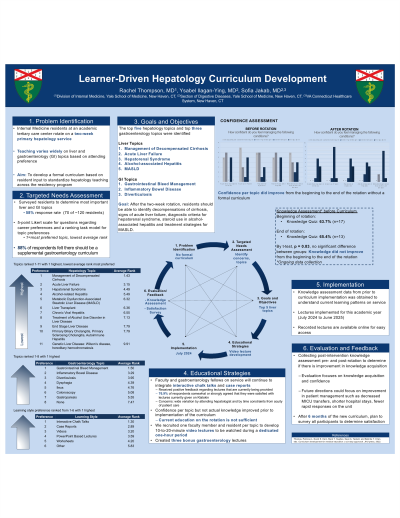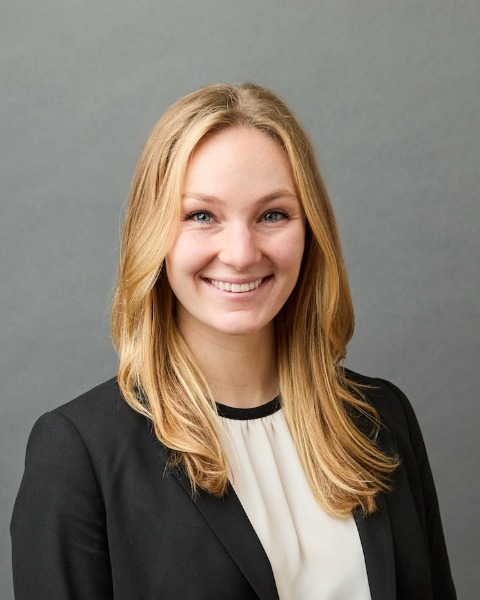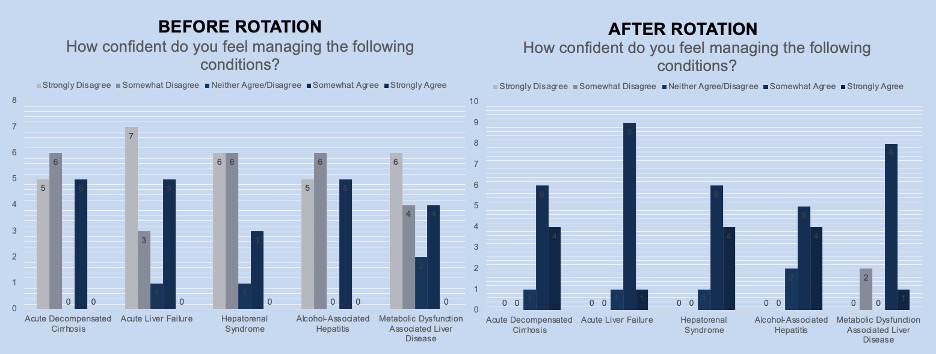Tuesday Poster Session
Category: Practice Management
P4897 - Learner-Driven Hepatology Curriculum Development
Tuesday, October 29, 2024
10:30 AM - 4:00 PM ET
Location: Exhibit Hall E

Has Audio

Rachel Thompson, MD
Yale New Haven Health
New Haven, CT
Presenting Author(s)
Rachel Thompson, MD1, Ysabel Ilagan-Ying, MD2, Simona Jakab, MD1
1Yale New Haven Health, New Haven, CT; 2Yale Digestive Diseases, New Haven, CT
Introduction: Internal Medicine residents at an academic tertiary care center participate in a two-week rotation on a primary hepatology service. Currently, hepatology topics are variably taught throughout the 2-week period based on attending preference. Our aim is to develop a formal curriculum based on resident input to standardize hepatology teaching across the residency program.
Methods: We developed a targeted needs assessment to determine which hepatology topics are most important to resident learners. Survey questions were created using a 5-point Likert scale for questions regarding career preferences and a ranking task model (1=most important) for lecture topic preferences. A pre- and post-rotation knowledge assessment was developed to test resident knowledge of the five most important hepatology topics.
Results: A total of 57 of 120 residents at an academic tertiary care center responded to the needs assessment survey (47.5% response rate). Liver topics were ranked based on average order of preference (highest=1). The most preferred topic was management of decompensated cirrhosis (1.43), followed by acute liver failure (3.15), hepatorenal syndrome (4.49), alcohol-related hepatitis (5.49), metabolic dysfunction-associated steatotic liver disease (6.32). Additionally, 88% (28/32) felt there should be a supplemental gastroenterology curriculum. Prior to implementation of curriculum, residents scored on average 63.7% (n=17) on a knowledge assessment at the beginning of the rotation and 65.4% (n=13) at the end of the rotation (p=0.83 by T-test). For each topic, resident confidence in management increased from pre-rotation to post-rotation (Figure 1).
Discussion: We have identified the top five hepatology topics that Internal Medicine residents feel are important for caring for patients on a dedicated hepatology service. Despite improvements in resident confidence from participating in the rotation, knowledge scores did not significantly improve. Given this lack of knowledge acquisition, we are actively creating teaching modules for each topic with the help of residents and expert faculty members.

Disclosures:
Rachel Thompson, MD1, Ysabel Ilagan-Ying, MD2, Simona Jakab, MD1. P4897 - Learner-Driven Hepatology Curriculum Development, ACG 2024 Annual Scientific Meeting Abstracts. Philadelphia, PA: American College of Gastroenterology.
1Yale New Haven Health, New Haven, CT; 2Yale Digestive Diseases, New Haven, CT
Introduction: Internal Medicine residents at an academic tertiary care center participate in a two-week rotation on a primary hepatology service. Currently, hepatology topics are variably taught throughout the 2-week period based on attending preference. Our aim is to develop a formal curriculum based on resident input to standardize hepatology teaching across the residency program.
Methods: We developed a targeted needs assessment to determine which hepatology topics are most important to resident learners. Survey questions were created using a 5-point Likert scale for questions regarding career preferences and a ranking task model (1=most important) for lecture topic preferences. A pre- and post-rotation knowledge assessment was developed to test resident knowledge of the five most important hepatology topics.
Results: A total of 57 of 120 residents at an academic tertiary care center responded to the needs assessment survey (47.5% response rate). Liver topics were ranked based on average order of preference (highest=1). The most preferred topic was management of decompensated cirrhosis (1.43), followed by acute liver failure (3.15), hepatorenal syndrome (4.49), alcohol-related hepatitis (5.49), metabolic dysfunction-associated steatotic liver disease (6.32). Additionally, 88% (28/32) felt there should be a supplemental gastroenterology curriculum. Prior to implementation of curriculum, residents scored on average 63.7% (n=17) on a knowledge assessment at the beginning of the rotation and 65.4% (n=13) at the end of the rotation (p=0.83 by T-test). For each topic, resident confidence in management increased from pre-rotation to post-rotation (Figure 1).
Discussion: We have identified the top five hepatology topics that Internal Medicine residents feel are important for caring for patients on a dedicated hepatology service. Despite improvements in resident confidence from participating in the rotation, knowledge scores did not significantly improve. Given this lack of knowledge acquisition, we are actively creating teaching modules for each topic with the help of residents and expert faculty members.

Figure: Confidence per topic improved from the beginning to the end of the rotation without a formal curriculum
Disclosures:
Rachel Thompson indicated no relevant financial relationships.
Ysabel Ilagan-Ying indicated no relevant financial relationships.
Simona Jakab indicated no relevant financial relationships.
Rachel Thompson, MD1, Ysabel Ilagan-Ying, MD2, Simona Jakab, MD1. P4897 - Learner-Driven Hepatology Curriculum Development, ACG 2024 Annual Scientific Meeting Abstracts. Philadelphia, PA: American College of Gastroenterology.
